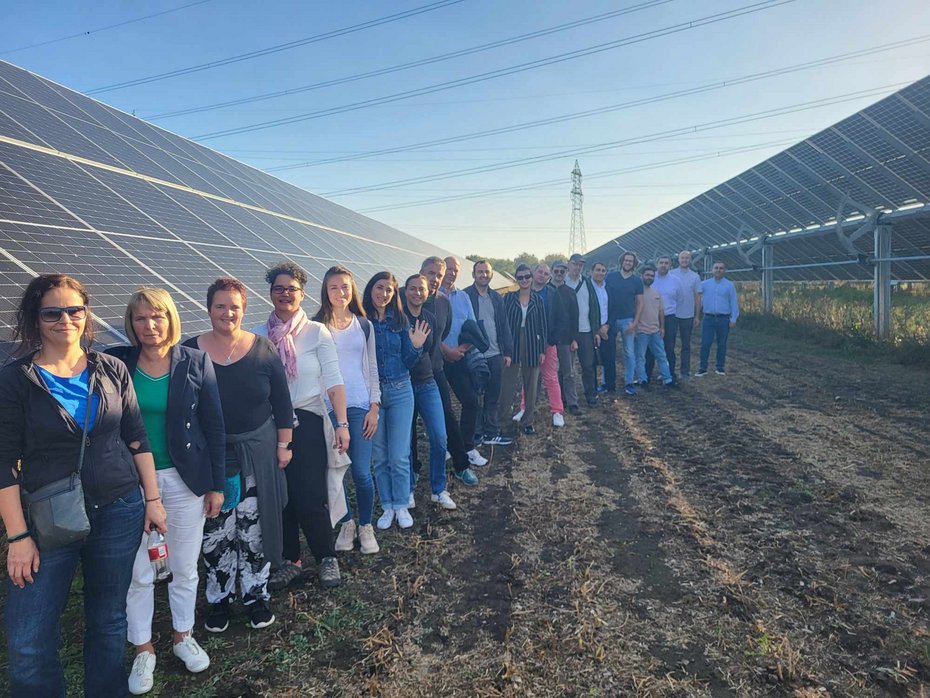SHAREs Study Tour
10/10/2023
Climate protection, stable energy prices and local value creation are just some of the reasons why more and more citizens are joining together in renewable energy communities. For many, however, the question arises as to what steps are necessary to set up their own energy community and contribute to the success of the energy transition. In order to provide their local heroes with an insight into this issue, a study tour was organised as part of SHAREs. The Austrian Energy Agency (AEA) and the German Cooperative and Raiffeisen Confederation (DGRV) invited 34 participants from municipalities and civil society from six countries to Germany and Austria in October. The aim of the study tour was to provide the participants with practical knowledge about the financial, legal and technical background of an energy community and to give them suitable tools to implement their own renewable energy projects. Three energy cooperatives in Freising, Altötting and Bruck an der Leitha were visited over the course of three exciting and content-packed project days.
Visiting Energiepark Bruck

Day 1: Solar electricity as a school project
On the first day of the project, we were warmly welcomed by the cooperative Bürger Energie Genossenschaft Freisinger Land near Munich. During a round of introductions, the participants presented the status of their projects and their experiences to date. The conclusion: the project ideas are just as diverse as the questions and expectations of the SHAREs mentoring programme. In the following session of the pioneer, Werner Hillebrand-Hansen, Chairman of the Board, presented the functioning of a cooperative and some of the established business models. A particular focus was on the processes involved in realising photovoltaic roof systems. After a rich Bavarian lunch, the participants saw the practical implementation of the content they had been taught. The first stop was a tenant electricity project that was realised in cooperation with the municipality. A 130 kWp system supplies the 115 flats below with solar power. The rest of the energy generated is fed into the public grid. Additional electricity required at times when the sun is not shining is also provided by the cooperative. From the photovoltaic systems on the roof to the meter room in the basement, the participants were given an all-round view of the operation of a tenant electricity project.
Next, the tour continued to a PV system on the roof of a school. A 100 kWp PV system supplies the school with renewable energy when it is needed most - during school hours. A nice extra of the community project: the data on electricity generation is made available to the pupils as hands-on learning material. This way, the importance of a green local power supply is passed on to the next generation.
Day 2: Innovation and cooperation
The second day was spent with the pioneer EnergieGenossenschaft Inn-Salzach (EGIS). Pascal Lang gave an insight into the varied work of his cooperative in the region around the town of Altötting. With ten years of experience, he vividly told the participants about the challenges that can arise when cooperating with the local council and how these can be overcome. This is very clearly illustrated by an innovative project in which a noise barrier was fitted with PV panels. After many years of dialogue and bureaucratic hurdles, the system was put into operation seven years ago and has since become the first system of its kind in Europe. A second excursion was made to a solar carport. These provide shade for parked cars in summer and at the same time generate electricity for the integrated charging stations for electric cars. This type of project is becoming increasingly popular as it contributes to the welfare of the community in several ways.
Day 3: Sharing energy with the community
On the last day of the event, the SHAREs project had the honour of visiting the new headquarters of Energiepark Bruck before its official opening. Upon arrival, Philip Loitsch, the regional manager of the community, gave an overview of the pioneering work of the energy community. Special attention was paid to the various ways of sharing electricity via the public grid. The Energiepark Bruck has a large number of renewable energy plants, three of which the participants were able to visit in the afternoon. One station was an agri-PV plant, which generates enough electricity for over 1,000 households on 5 hectares without interrupting agricultural activities. The participants were able to see how the system constantly changes the orientation of the angles in order to maximise solar radiation for both agricultural production and electricity generation. At a second station, the processes in a biogas plant were explained, which converts waste from households and agriculture into electricity and gas since 2014. The grand finale was the 296-step climb up to the nacelle of a wind turbine.
It is now hoped that the topics learnt during the study trip will be applied in the project countries Hungary, Croatia, Bulgaria, Georgia and Germany. The SHAREs project will continue to support its pilots in their next steps through the mentoring programme.